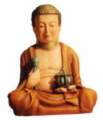
REAL STATE OF THINGS
Since everything in this world is brought about by causes and conditions, there
can be no fundamental distinctions among things. The apparent distinctions exist
because of people's absurd and discriminating thoughts. In the sky there is
distinction of east and west; people create distinctions out of their own minds
and then believe them to be true. Mathematical numbers from one to infinity
are each complete numbers, and each in itself carries no distinction of quantity;
but people make the discrimination for their own convenience, so as to be able
to indicate varying amounts. Inherently there are no distinctions between the
process of life and the process of destruction; people make a discrimination
and call one birth and the other death. In action, there is no discrimination
between right and wrong, but people make a distinction for their own convenience.
Buddha keeps away from these discriminations and looks upon the world as upon
a passing cloud. To Buddha, every definitive thing is illusion; He knows that
whatever the mind grasps and throws away is insubstantial; thus He transcends
the pitfalls of images and discriminative thought. People grasp at things for
their own imagined convenience and comfort; they grasp at wealth and treasure
and honors; they cling desperately to mortal life. They make arbitrary distinctions
between existence and non-existence, good and bad, right and wrong. For people,
life is a succession of graspings and attachments, and then, because of this,
they must assume the illusions of pain and suffering. Once there was a man on
a long journey, who came to a river. He said to himself: "This side of
the river is very difficult and dangerous to walk on, and the other side seems
easier and safer, but how shall I get across?" So he built a raft out of
branches and reeds and safely crossed the river. Then he thought to himself:
"This raft has been very useful to me in crossing the river; I will not
abandon it to rot on the bank, but will carry it along with me." And thus
he voluntarily assumed an unnecessary burden. Can this man be called a wise
man? This parable teaches that even a good thing, when it becomes an unnecessary
burden, should be thrown away; much more so if it is a bad thing. Buddha made
it the rule of His life to avoid useless and unnecessary discussions. Things
do not come and go; neither do they appear and disappear; therefore, one does
not get things or lose things. Buddha teaches that things neither appear nor
disappear since they transcend both the affirmation of existence and the denial
of existence. That is, everything being a concordance and succession of causes
and conditions, a thing in itself does not exist, so it can be said that it
is non-existent. At the same time, because it has a relative connection with
causes and conditions, it can be said that it is non-existent. To adhere to
a thing because of its form is the source of delusion. If the form is not grasped
and adhered to, this false imagination and absurd delusion will not occur. Enlightenment
is seeing this truth and being free from such a foolish delusion. The world,
indeed, is like a dream and the treasures of the world are an alluring mirage.
Like the apparent distances in a picture, things have no reality in themselves
but are like heat haze. To believe that things created by an incalculable series
of causes can last forever is a serious mistake and is called the theory of
permanency; but it is just as great a mistake to believe that things completely
disappear; this is called the theory of non-existence. These categories of everlasting
life and death, and existence and non-existence, do not apply to the essential
nature of things, but only to their appearances as they are observed by defiled
human eyes. Because of human desire, people become related and attached to these
appearances; but in the essential nature of things, they are free from all such
discriminations and attachments. Since everything is created by a series of
causes and conditions, the appearances of things are constantly changing; that
is, there is no consistency about it as there should be about authentic substances.
It is because of this constant changing of appearances that we liken things
to a mirage and a dream. But, in spite of this constant changing in appearances,
things, in their essential spiritual nature, are constant and changeless. To
a man, a river seems like a river, but to a hungry demon which sees fire in
water, it may seem to be like fire. Therefore, to speak to a man about a river
existing would have some sense, but to the demon it would have no meaning. In
life manner, it can be said that things are like illusions; they can be said
neither to be existent nor non-existent. Yet, it can not be said that, apart
from this world of change and appearance, there is another world of permanence
and truth. It is a mistake to regard this world as either a temporal world or
as a real one. But ignorant people of this world assume that this is a real
world and proceed to act upon that absurd assumption. But as this world is only
an illusion, their acts, beings based upon error, only lead them into harm and
suffering. A wise man, recognizing that the world is but an illusion, does not
act as if it were real, so he escapes the suffering.